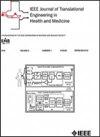Improving Transformer Performance for French Clinical Notes Classification Using Mixture of Experts on a Limited Dataset
IF 4.4
3区 医学
Q2 ENGINEERING, BIOMEDICAL
IEEE Journal of Translational Engineering in Health and Medicine-Jtehm
Pub Date : 2025-06-04
DOI:10.1109/JTEHM.2025.3576570
引用次数: 0
Abstract
Transformer-based models have shown outstanding results in natural language processing but face challenges in applications like classifying small-scale clinical texts, especially with constrained computational resources. This study presents a customized Mixture of Expert (MoE) Transformer models for classifying small-scale French clinical texts at CHU Sainte-Justine Hospital. The MoE-Transformer addresses the dual challenges of effective training with limited data and low-resource computation suitable for in-house hospital use. Despite the success of biomedical pre-trained models such as CamemBERT-bio, DrBERT, and AliBERT, their high computational demands make them impractical for many clinical settings. Our MoE-Transformer model not only outperforms DistillBERT, CamemBERT, FlauBERT, and Transformer models on the same dataset but also achieves impressive results: an accuracy of 87%, precision of 87%, recall of 85%, and F1-score of 86%. While the MoE-Transformer does not surpass the performance of biomedical pre-trained BERT models, it can be trained at least 190 times faster, offering a viable alternative for settings with limited data and computational resources. Although the MoE-Transformer addresses challenges of generalization gaps and sharp minima, demonstrating some limitations for efficient and accurate clinical text classification, this model still represents a significant advancement in the field. It is particularly valuable for classifying small French clinical narratives within the privacy and constraints of hospital-based computational resources. Clinical and Translational Impact Statement—This study highlights the potential of customized MoE-Transformers in enhancing clinical text classification, particularly for small-scale datasets like French clinical narratives. The MoE-Transformer's ability to outperform several pre-trained BERT models marks a stride in applying NLP techniques to clinical data and integrating into a Clinical Decision Support System in a Pediatric Intensive Care Unit. The study underscores the importance of model selection and customization in achieving optimal performance for specific clinical applications, especially with limited data availability and within the constraints of hospital-based computational resources在有限数据集上使用混合专家改进法语临床笔记分类的变压器性能
基于变压器的模型在自然语言处理方面取得了突出的成果,但在分类小规模临床文本等应用方面面临挑战,特别是在计算资源有限的情况下。本研究提出了一个定制的混合专家(MoE)变压器模型,用于在CHU圣贾斯汀医院对小规模法语临床文本进行分类。MoE-Transformer解决了使用有限数据进行有效培训和适合医院内部使用的低资源计算的双重挑战。尽管CamemBERT-bio、DrBERT和AliBERT等生物医学预训练模型取得了成功,但它们的高计算要求使它们在许多临床环境中不切实际。我们的MoE-Transformer模型不仅在相同的数据集上优于DistillBERT、CamemBERT、FlauBERT和Transformer模型,而且还取得了令人印象深刻的结果:准确率为87%,精密度为87%,召回率为85%,f1分数为86%。虽然MoE-Transformer的性能没有超过生物医学预训练BERT模型,但它的训练速度至少快190倍,为数据和计算资源有限的设置提供了可行的替代方案。尽管MoE-Transformer解决了泛化差距和锐最小值的挑战,展示了有效和准确的临床文本分类的一些限制,但该模型仍然代表了该领域的重大进步。它对于在基于医院的计算资源的隐私和限制范围内对小型法国临床叙述进行分类特别有价值。临床和翻译影响声明:本研究强调了定制的moe - transformer在增强临床文本分类方面的潜力,特别是对于像法国临床叙述这样的小规模数据集。MoE-Transformer的性能优于几个预训练的BERT模型,标志着在将NLP技术应用于临床数据并集成到儿科重症监护病房的临床决策支持系统方面迈出了一大步。该研究强调了模型选择和定制对于实现特定临床应用的最佳性能的重要性,特别是在数据可用性有限和基于医院的计算资源受限的情况下
本文章由计算机程序翻译,如有差异,请以英文原文为准。
求助全文
约1分钟内获得全文
求助全文
来源期刊

IEEE Journal of Translational Engineering in Health and Medicine-Jtehm
Engineering-Biomedical Engineering
CiteScore
7.40
自引率
2.90%
发文量
65
审稿时长
27 weeks
期刊介绍:
The IEEE Journal of Translational Engineering in Health and Medicine is an open access product that bridges the engineering and clinical worlds, focusing on detailed descriptions of advanced technical solutions to a clinical need along with clinical results and healthcare relevance. The journal provides a platform for state-of-the-art technology directions in the interdisciplinary field of biomedical engineering, embracing engineering, life sciences and medicine. A unique aspect of the journal is its ability to foster a collaboration between physicians and engineers for presenting broad and compelling real world technological and engineering solutions that can be implemented in the interest of improving quality of patient care and treatment outcomes, thereby reducing costs and improving efficiency. The journal provides an active forum for clinical research and relevant state-of the-art technology for members of all the IEEE societies that have an interest in biomedical engineering as well as reaching out directly to physicians and the medical community through the American Medical Association (AMA) and other clinical societies. The scope of the journal includes, but is not limited, to topics on: Medical devices, healthcare delivery systems, global healthcare initiatives, and ICT based services; Technological relevance to healthcare cost reduction; Technology affecting healthcare management, decision-making, and policy; Advanced technical work that is applied to solving specific clinical needs.
 求助内容:
求助内容: 应助结果提醒方式:
应助结果提醒方式:


